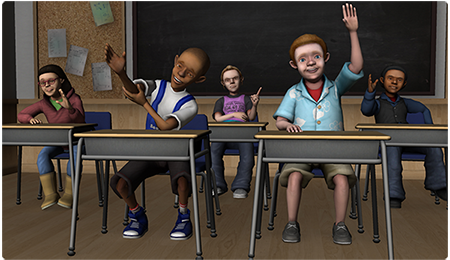Students perfect teaching skills in virtual classroom
Education majors are getting real word teaching experience thanks in part to TeachLivE™, a mixed-reality simulation lab that supports teacher practice in classroom management.
The virtual lab looks like a typical classroom—complete with desks, whiteboards and student avatars. The simulated classroom is projected onto a screen, and a session participant stands in front of the class while a camera tracks his or her movements as they virtually teach. Participants interact with the avatars in real-time, presenting lesson plan material, answering questions and monitoring students as they complete assignments.
According to associate professor Jane Sileo (Educational Studies), student avatars are scripted to portray typically developing students or students with more complex learning needs, depending on the objectives of the simulation session. This practice, in conjunction with field work, said Sileo is “providing our teacher candidates with additional opportunities to practice their knowledge and skills in a safe environment with no risk.”
For School of Education student Stephanie Wexler ’15, who is a dual major in secondary special education and literacy, the extra practice is invaluable.
“It can be scary teaching for the first time and with the simulator you are able to work with students and not have the fear of messing up the content or wasting time on a failed strategy,” she said. “Using the simulator has been a great learning experience.”
Michael Rosenberg, dean of the School of Education, noted that the innovative technology is also providing support for faculty. He said that “in addition to the technology allowing the school to expand both the range and depth of our programs’ clinically rich learning experiences, it provides faculty with additional tools to enhance the efficacy of teacher and school leader preparation as well as on-going professional development.”
According Sileo, the application is currently available to a select group of undergraduate and graduate classes, primarily those related to special education and teaching candidates in educational administration. Plans are to expand the simulator’s use by offering sessions to additional students and faculty in the School of Education in the near future.

